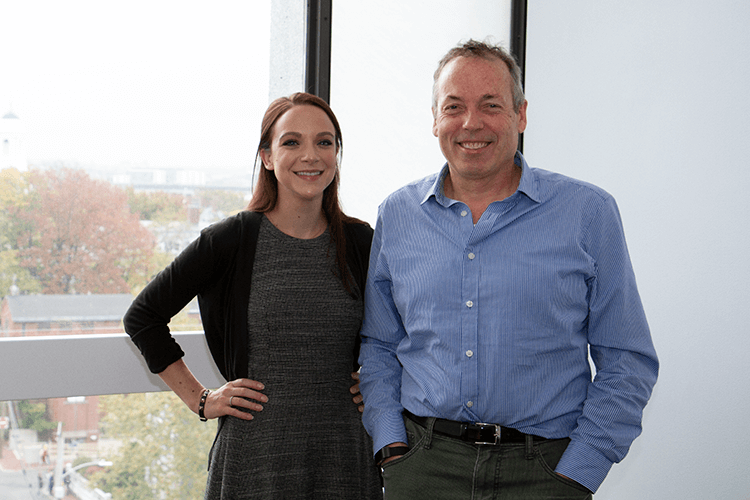News All News
January 8th, 2020
R&D alliance between Harvard and Deerfield announces first project agreement
Lab1636 commits to advance certain Harvard innovations toward a possible therapeutic for tactile hypersensitivity experienced in autism spectrum disorders

Profs. Lauren Orefice and David Ginty discuss their research in more detail in a Harvard Gazette Q&A. (File photo: Harvard OTD.)
Cambridge, Mass. – January 8, 2019 – Lab1636, the R&D alliance between Harvard University and Deerfield Management Company, announced today its first project agreement to advance Harvard researchers’ innovations toward the development of novel therapeutics. Lab1636 has committed to a first project out of the laboratory of David Ginty, PhD, the Edward R. and Anne G. Lefler Professor of Neurobiology in the Blavatnik Institute at Harvard Medical School (HMS) and a Howard Hughes Medical Institute Investigator.
Launched in March 2019, Lab1636 is a major strategic R&D alliance between Harvard and the healthcare investment firm Deerfield to speed the development and translation of biomedical and life-science innovations into transformative treatments to improve life, health, and medical care. Lab1636 was established with a funding commitment of up to $100 million from Deerfield.
Through this first project, Lab1636 will dedicate focused resources to advancing innovations with great therapeutic potential for patients. Recognized for his lab’s elucidation of the peripheral nervous system, Ginty seeks to answer fundamental questions in neuroscience relating to how we perceive and respond to our environment. Over the past few years, in particular, significant strides in understanding tactile hypersensitivity have been led by a postdoctoral researcher in his lab, Lauren Orefice, PhD, who is now Assistant Professor of Genetics at HMS and Massachusetts General Hospital. Together, they identified certain compounds that may point the way to a treatment for the touch hypersensitivity experienced by people with autism spectrum disorders.
“It’s exciting to see discoveries made in my lab being propelled into therapeutic development, where they can benefit from the medicinal chemistry expertise and clinical expertise of other groups,” said Ginty. “The resources at Harvard to support translational biomedical innovation were really instrumental in helping us advance this work to a jumping-off point, and I’m hopeful that further development and clinical testing of the results could make a significant and lasting difference in the lives of patients.”
The Ginty Lab’s research in this area has previously received funding from the federal government and the Simons Foundation, as well as translational research funding from Harvard’s Blavatnik Biomedical Accelerator and Q-FASTR at HMS. Lab1636 is now poised to validate and expand upon the lab’s findings, advancing them through late-stage preclinical development.
“We’re thrilled by the momentum of the Lab1636 alliance so far,” said Vivian Berlin, Managing Director of Strategic Partnerships in Harvard’s Office of Technology Development, which spearheaded the creation of Lab1636 with Deerfield. “The collaboration holds great promise to drive rapid innovation across many fields of biomedical science and translate valuable insights into real-world impact.”
“This is an important milestone for Lab1636 and potentially for people suffering from tactile hypersensitivity,” said James E. Flynn, Managing Partner at Deerfield. “We look forward to continued progress in Professor Ginty’s novel work and other exciting developments on the horizon at Harvard.”
A private company wholly owned by affiliates of Deerfield, Lab1636 supports Harvard R&D projects through various stages of drug discovery and development, for example enabling studies to explicate the biology of disease, validate therapeutic targets, or achieve a proof-of-concept necessary for filing an Investigational New Drug (IND) application. Harvard’s R&D projects funded by Lab1636 are initiated by principal investigators from labs across the University and selected by a joint advisory committee.
See also: Harvard professors David Ginty and Lauren Orefice discuss their translational research in a Q&A published today.
Tags: alliances , neuroscience
Press Contact: Kirsten Mabry | (617) 495-4157
